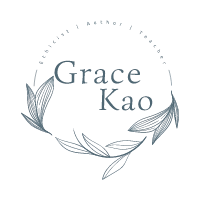Frequently Asked Questions
Will you speak at my event or can I interview you?
Schedule permitting, Dr. Kao enjoys speaking to diverse audiences in large or small group settings and also appearing as a guest on podcasts or other media. Recent topics include reproductive justice, rethinking ethical human-animal relations, Asian American Christianity, Christian feminism, LGBTQIA+ affirmation from a Christian perspective, and topics related to her recent book on surrogacy (assisted reproductive technology, parenthood, queer families).
She also enjoys guesting in her colleagues’ classes when her expertise could be of service to them. Please contact her via email (gkao@cst.edu) to inquire about the possibility of booking her.
Interested in checking out her upcoming and recent events?
What books are you working on?
 While promoting My Body, Their Baby: A Progressive Christian Vision for Surrogacy, Dr. Kao is also at work on other book projects.
While promoting My Body, Their Baby: A Progressive Christian Vision for Surrogacy, Dr. Kao is also at work on other book projects.
Her next project is a book tentatively entitled Righting Wrongs: Reparations and Reconciliation in Asian American Contexts.
Within an Asian American Christian ethics methodology, Dr. Kao weaves together the human rights norms of her first book (Grounding Human Rights in a Pluralist World) and the feminist theological lens she brings to her work more generally. Righting Wrongs examines several cases of historic injustices committed against Asian Americans for which the federal government has either officially apologized or expressed regret (viz., the Chinese Exclusion Act, the mass incarceration of Japanese Americans, and the denial of full veteran benefits to Filipinos who fought under the U.S. flag during World War II). It does so through the prisms of philosophical and feminist theological discussions on intergenerational apologies, forgiveness, and moral repair; the emerging human rights framework for reparations as articulated in an important 2005 UN resolution; and assorted voices from Asian America.

Interested in reading more about Dr. Kao’s published books?
What classes are you teaching now or next?
For Spring 2025, Dr. Kao is teaching Religion & Human rights in a modified intensive format and Feminist Theology & Ethics asynchronously.
In Fall 2025, she is scheduled to teach (1) Intro to Christian Ethics and (2) Christian Bioethics.
Interested in perusing all of Dr. Grace Kao’s course descriptions?
Can I schedule an office hour appointment?
 Grace Kao enjoys meeting with students one-on-one. Use her online scheduler to schedule appointments to meet with her at a mutually convenient time.
Grace Kao enjoys meeting with students one-on-one. Use her online scheduler to schedule appointments to meet with her at a mutually convenient time.
Please note: discussing any sensitive issues or concerns you might have with Dr. Kao immediately before or after class (beyond the 10 minutes she will ordinarily stay) is not wise because of the lack of privacy and because she might be trying to get ready for class or leaving to get to another appointment. Book an appointment instead.
Will you write me a letter of recommendation?
If you’ve asked Grace Kao (or most other academics) this question, you’ve already likely made a mistake. Rather than ask IF she will write you a letter of recommendation, you should ask WHETHER she can write you a STRONG one. After inquiring, you should graciously accept whatever answer she provides you. If she indicates that her support for you will only be lukewarm or pro forma, you should spend your time looking for someone else.
That might sound harsh, but Dr. Kao has sat on numerous admissions, scholarships, and search committees since she started working full-time in academe in 2003 and has come across many a lackluster LOR that begin with something like this “X has asked that I write him/her a letter of recommendation.”
Recommenders are often asked to rank applicants not just in comparison to peers in the same course, degree program, or graduating class, but within the last 5-10 years or even within a lifetime of their careers. So even if you’ve earned a solid A in one of her courses, you might only be “average” in comparison with all the talented students with whom she’s worked. Sobering news, for sure, but you should know the context from which you’ll be evaluated.
Please note that Dr. Kao will only write letters for those who have waived their right to review them since (1) reference letters are sometimes not as heavily weighted by selection committees if they know students have access to them, (2) she will need the freedom to compare you to other students and that information should remain confidential.
If she does agree to write you a (strong) letter of recommendation, you will need to provide her AT LEAST THREE WEEK’S NOTICE. In addition, this is what she’ll need from you:
(1) Information about the job, graduate school, scholarship, or other opportunity for which you are applying. Include web addresses and/or hyperlinks to this information where appropriate as well as the physical address of the institution and to whom the recommendation should be addressed (so she can format her letter correctly).
(2) A copy of your c.v. or resume. It doesn’t have to be camera-perfect, but it will help her fill out basic information about you.
(3) A copy of the personal statement or essay you will be sending with your application.
(4) Information about who your other recommenders will be in the interests of your putting together the best dossier possible. For instance, if she knows that she will be the only one who can speak to your leadership abilities, she’ll be sure to do so. However, if she knows that others will be discussing your confidence in delivering presentations and ability to think quickly on your feet, she’ll emphasize different strengths instead.
(5) A one-page sheet of bulleted points containing two different types of information.
a. The various ways in which you and Dr. Kao have interacted with each other and the contexts in which she’s had the opportunity to evaluate your performance. Include the courses you’ve taken with her (and the grades you received in them), committees you might have served on together with her, and all of the relevant dates. If you recall her particularly liking a paper, project, or presentation you did, remind her of that, too.
b. A list of bulleted points that you’d ideally like her to highlight (i.e., about your character, strengths, suitability for the job/honor/award). You will no doubt note that “a” and “b” are related.
(6) Information about the application deadline as well as information about how her LOR for you is to be sent–by mail? by e-mail? by an online form?
In ideal circumstances, you will have chatted in person with her during office hours about your application and strategized together how best to increase your chances for “getting” whatever it is you want.
As to HOW you will get all of that information to her, it would be best if you sent everything in ONE e-mail.
Finally, you should send her a reminder (via e-mail) one week beforehand. If she hasn’t responded back, you should send her another reminder e-mail 1-2 days before the deadline. In short, do not stop sending gentle reminders until you receive a confirmation from her that her LOR has been sent.
Professor Kao wishes you the best and hopes that the selection committee(s) look upon your applications favorably!
How do I pronounce your (last & middle) names?
Grace Kao’s last name rhymes with the animal pictured below, but it’s pronounced with a “g” (not a hard “k”) sound.
 Kao is pronounced like “Gow”
Kao is pronounced like “Gow”
Though she publishes under “Grace Y. Kao,” her full name is Grace Yia-Hei Kao.
Kao (高; pinyin: gāo) – means “high” or “tall,” but it’s just a last name
Yia ( 雅; pinyin: yǎ) – means “elegant”
Hei (慧; pinyin: huì) – means “wise” or “knowledgable”
Press Inquiries
Adam Schnitzer, Marketing & Sales Director
aschnitzer@stanford.edu
Mailing Address
Claremont School of Theology
10497 Wilshire Blvd, Los Angeles, CA 90024
Office Hours
(Book directly by clicking the image)
Event Inquiries
(click the icon)



